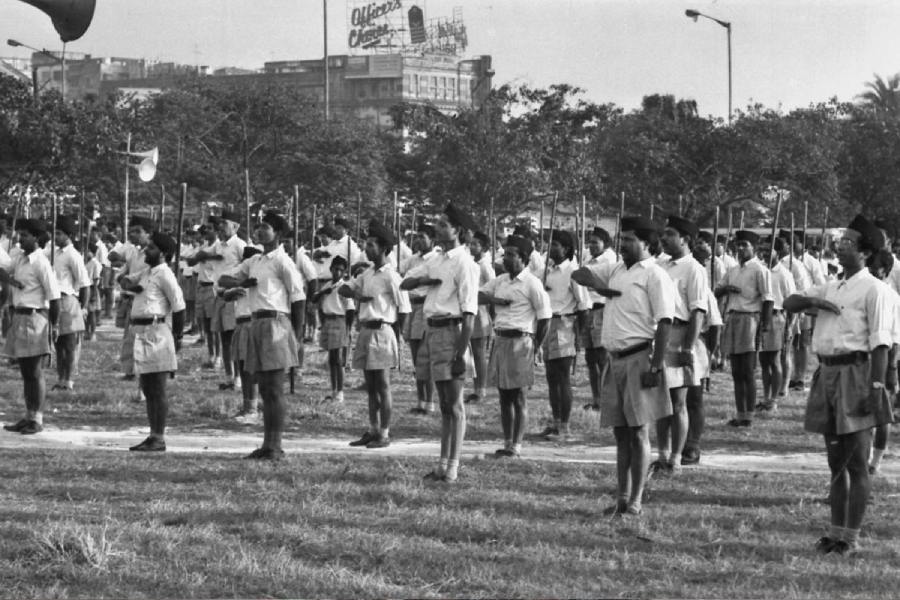My father Jitendranath Banerjee was a staunch RSS activist. He grew up in Benaras, where he came to know about the Rashtriya Swayamsevak Sangh (RSS). He left home and became a pracharak or a full-time worker after his Intermediate exams.
He travelled across the country as a pracharak. He knew RSS founder Keshav Hedgewar and was closely associated with M.S. Golwalkar. He went on to become an all-India pracharak. Then Nathuram Godse killed Mahatma Gandhi, and all the big RSS leaders were thrown into jail and so was my father.
When Syama Prasad Mookerjee died in Kashmir in 1953, they couldn’t find a single Bengali-speaking pracharak to work in West Bengal; they sent my father.
But the RSS does not allow people to remain pracharaks when they marry. My father got married in 1954. My mother was from a family of Congress supporters. I was born in 1956.
My father took me to RSS when I was a boy. I was good at sports. I played cricket, football and table tennis but the Sangh does not allow these “foreign” games even though now Amit Shah and his son are big cricket people. At the RSS shakhas, we played kabaddi and old village games like Bhasmasur. In time, I became a youth organiser, And before I knew it, I was neck-deep in their ideology.
That ideology is and has been — India is for Hindus and Hindus only, Muslims are invaders, Christians came here to destroy Hinduism and women are second-class citizens...
It used to be mandatory to go to the shakha for an hour every day. They made you do drills, marches, lathi-khela, sword-khela and then there was the brainwashing.
At Calcutta’s Scottish Church Collegiate School, I would be ridiculed by my classmates because I was the only RSS boy in school. But my father’s influence continued to hold sway. Those days, in a middle-class Bengali household, the father decided everything. My mother never liked the RSS people, but she said nothing openly. She liked them personally as her husband’s friends. One of my maternal uncles was an INTUC (Indian National Trade Union Congress) leader. His influences were also working on me but at the same time, I was a deeply entrenched RSS guy. I was a Muslim hater, a very chauvinistic man. My intellectual background was zero, but I was full of bombast.
In 1971, the RSS sent me to the Officers Training Camp in Burdwan for three years. The Bangladesh Liberation War was in full swing, people were dying, refugees were coming in, but there was no talk of all that within the RSS.
The camp was my first rigorous training. I came back and basically rebuilt the shakha in north Calcutta. They took me into the Akhil Bharatiya Vidyarthi Parishad or ABVP fold at that time. Golwalkar came to Burdwan. He called me and gave me some advice, and instructed his personal secretary to correct my Sanskrit pronunciation as I was in charge of the Sanskrit prayers at the RSS camp for a whole month.
Pracharak Keshav Dikshit sent me to Delhi as a Jana Sangh delegate when the Janata Party was formed. At 21, I became one of the joint secretaries of the West Bengal ABVP and remained so for the next four years.
In the meantime, I did my BSc and then my MSc.
It was around this time that I started having misgivings about the RSS and its preachings. They were fascists, Hitler worshippers and they would compare Indian Muslims with Germany’s Jews.
But on a personal level, they were honest and dedicated people. Women were never part of the RSS, because the RSS does not believe in gender equality. They don’t believe in democracy. They think Dalits are dirt.
I was deeply conflicted. I would stop going to the shakha for days altogether and then they would come to my house and enquire after me. There was always a lot of personal affection, personal friendship.
These are very important things for any grassroots organisation and the RSS does it very well. That is why they are so big today. Not because of their intellectual philosophy. I have seen it all from inside.
In 1978, my mother died of cancer when she was 42. I was now closer to the big step which I was to take in three more years. There was a state RSS conference in Calcutta. I put down a series of questions that were on my mind. I cyclostyled my copies of questions and distributed them among hundreds of delegates. I told them at the shakha that if I did not get answers then this was the last time I would be attending an RSS conference.
I asked them what kind of politics does the RSS preach, do they believe in equality, do they believe in socialism, do they believe in capitalism, do they believe in communism. Those questions were very naive but they were very heartfelt. I asked them what they made of Rabindranath Tagore because there was never any discussion about him.
That was the last time.
There was no reaction. Most people did not really understand the questions. Those who understood, were shocked. I took up a college lecturer’s job in the Sunderbans and then in some years I decided to go to the United States to do my PhD, leaving my family, friends, and everything I knew behind.
As told to Anasuya Basu










